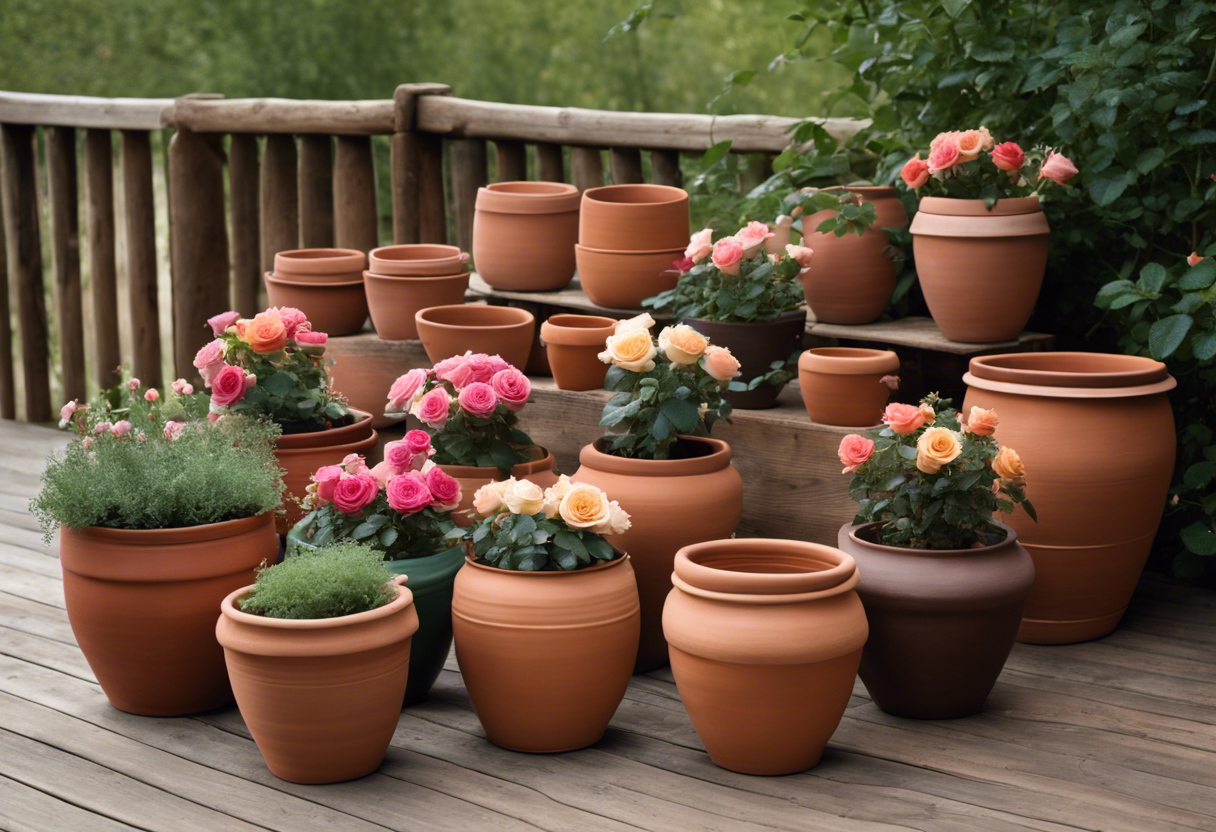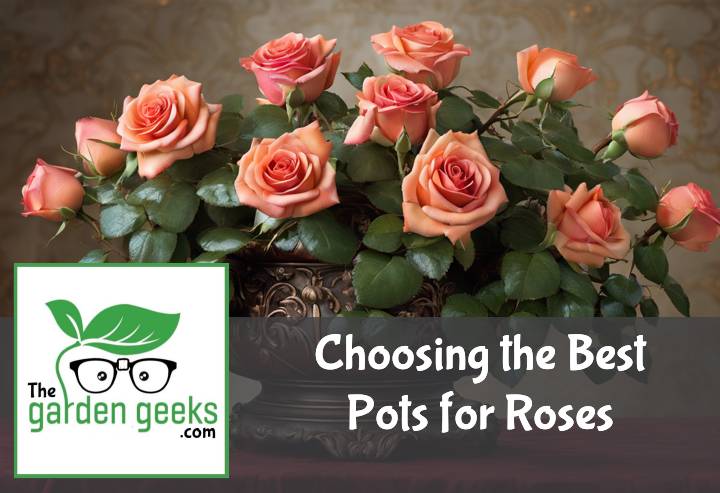You know, there’s something incredibly rewarding about growing roses. The vibrant colors, the intoxicating scent – it’s like having a little piece of paradise right in your backyard. But here’s a secret: the key to healthy, blooming roses isn’t just about sunlight or water; it’s also about choosing the Best Pots for Roses.
Choosing the right pot can be a game-changer, folks! It’s not just about aesthetics; it’s more like picking a home for your roses. You want them to be comfortable, have enough space to grow, and most importantly, be healthy. So buckle up as we dive into the world of pots and roses. Keep reading about Choosing the Best Pots for Roses (With Examples).
Key Takeaways
- The best pots for roses are those with good drainage, such as terracotta or ceramic pots.
- Size matters; choose a pot that’s at least 1 foot in diameter and depth for each rose bush.
- Self-watering pots can be beneficial for busy gardeners.
- Examples of suitable pots include the Bloem Terra Pot Planter, Classic Home and Garden Corinthian Bowl Planter, and the Novelty Full Depth Round Cylinder Pot.

Why is Choosing the Right Pot for Roses Important?
Choosing the best pots for roses isn’t just about aesthetics. It’s a vital part of ensuring your roses thrive. Factors like pot size, material, and drainage can significantly impact rose health. So, let’s dive into why rose pot selection is so crucial.
The Impact of Pot Size on Rose Health
When it comes to pot size, Goldilocks had it right – not too big, not too small, but just right! An undersized pot can stunt growth and cause root congestion. On the other hand, an oversized pot might make your roses feel lost and lonely.
The key here is balance. A well-sized pot allows roots to spread comfortably while keeping the plant stable. Remember folks, size does matter when we talk about growth in different sized pots!
The Role of Material in Pot Selection
Material matters too! Different materials influence your roses’ wellbeing in various ways. For instance, clay pots are breathable and great for temperature regulation but can be heavy and prone to cracking.
On the flip side, plastic pots are lightweight and affordable but may not offer the same breathability or aesthetic appeal as their clay counterparts. So choose wisely considering both benefits and drawbacks of common materials when picking out a home for your roses.
Drainage Considerations for Rose Pots
Lastly, let’s talk about drainage. Just like us after a long night out, roses don’t like waterlogged conditions! Proper drainage is crucial to prevent root rot and other water-related issues.
Your choice of pot plays a significant role here – some materials drain better than others, and certain designs allow more water to escape than others do. So remember folks – when choosing a rose pot, don’t forget to consider those all-important drainage holes!
What are the Different Types of Pots Suitable for Roses?

Let’s dive into the world of rose pot types. There’s a whole array of suitable pots for roses out there, each with its own unique characteristics and benefits. We’re talking about everything from terracotta to plastic, all perfect for your rose container gardening needs.
Terracotta Pots
Terracotta pots? Oh, they’re a classic! These terracotta pots for roses are loved by many gardeners because they’re breathable. Yep, you heard it right! The breathability of terracotta helps prevent root rot and overwatering.
But wait, there’s more! They’re also pretty durable. You can count on these durable rose pots to last you a good few seasons. Plus, let’s not forget their aesthetic appeal. Those rustic-looking aesthetic terracotta planters can make any rose bush look like a million bucks!
Ceramic Pots
Next up on our list: ceramic pots. These guys are known for their variety in designs. With ceramic pots for roses, you can find just about any color or pattern to match your garden vibe.
But it’s not all about looks here. Ceramic pots also have great insulation properties. This means that your roses will stay cozy and warm during those chilly nights – thanks to the insulation properties of ceramic planters.
Plastic Pots
If you’re looking for something lightweight and affordable, then plastic pots might be your best bet. These plastic pots for roses are easy to move around and won’t break the bank.
Don’t underestimate these guys though; they may be light but they sure are tough! Plus, let’s face it: who doesn’t love an affordable option when it comes to gardening supplies? So yes, these affordable plastic planters are a solid choice for your roses.
Wooden Planters
Last but definitely not least, we have wooden planters. Now these wooden planters for roses bring a certain organic look to the table that’s hard to resist. They blend in perfectly with the natural surroundings and give your garden that ‘back-to-nature’ feel.
But it’s not just about looks here either. Wooden planters are also great at retaining moisture, which is super important for rose health. So if you’re after that rustic charm and want a planter that keeps your roses hydrated, these moisture retaining wood containers are the way to go!

How to Choose the Best Pot Size for Your Roses?
When it comes to rose cultivation, the size of your pot is a big deal. It’s like choosing a home for your roses, and you want it to be just right.
Understanding Root Space Requirements
You see, roses are pretty particular about their root space requirements. They need enough room to spread out and grow, but not so much that they feel lost in a sea of soil. So, understanding these requirements can help you pick the appropriate pot size.
The root space is crucial for plant health and optimal growth. If the roots are cramped or have too much space, your roses might throw a bit of a tantrum. And trust me, you don’t want to deal with a grumpy rose plant.
Considering Growth Potential of Rose Varieties
Now let’s talk about the growth potential of different rose varieties. Some roses are like those friends who love sprawling out on your couch – they need lots of space! Others are more compact and content in smaller spaces.
This growth potential can greatly influence your pot size selection. You wouldn’t put a Great Dane in a Chihuahua-sized dog house, would you? Same goes for your roses.
Understanding each variety’s growth habits will help ensure proper plant development and ultimately lead to healthier, happier roses. After all, we’re aiming for blooming marvellous results here!
What are Some Examples of Ideal Pots for Roses?
Choosing the right pot for your roses is a game-changer. It’s like finding the perfect pair of jeans – it just makes everything better! The best pots for roses depend on the type of rose, its size, and its growing habits. So let’s dive into some examples.
Example 1: Large Terracotta Pot for Climbing Roses
Climbing roses are like the teenagers of the rose world – they need space to grow and spread out. That’s why a large terracotta pot is their best buddy. These pots provide ample room for roots to stretch out and breathe. Plus, terracotta is porous, so it helps prevent waterlogging – a big no-no in rose container gardening.
But hold up! There are a few downsides too. Terracotta pots can be heavy to move around (good luck if you’ve got a bad back!) and they can crack in frosty weather. So, if you’re living somewhere colder than a snowman’s nose, you might want to think twice about these terracotta climbing rose containers.
Example 2: Medium Ceramic Pot for Hybrid Tea Roses
Hybrid tea roses are the divas of the garden – beautiful but high maintenance! A medium ceramic pot is just what they need. Ceramic pots retain moisture well, which these thirsty beauties love. Plus, they’re sturdy enough to support these tall stems without tipping over.
However, there’s always a flip side. Ceramic pots can be quite heavy (not great if you fancy rearranging your garden on a whim) and they can break easily if dropped (so no juggling!). But overall, these ceramic containers for hybrid tea roses are worth every penny!
Example 3: Small Plastic Pot for Miniature Roses
Miniature roses are like tiny bundles of joy. They don’t need much space, making small plastic pots a great choice. These pots are lightweight and easy to move around – perfect if you’re an indecisive gardener who likes to mix things up! Plus, they’re pretty durable and won’t break the bank.
But let’s be real, plastic isn’t perfect. It doesn’t breathe as well as terracotta or ceramic, so you’ll need to be careful not to overwater. And while they’re cheap and cheerful, they might not last as long as other options. But for these little miniature roses in plastic pots, it’s a match made in heaven!
How to Properly Repot a Rose Plant into a New Pot?
Repotting roses is an essential part of rose plant care. It’s like moving your beloved pet from a cramped cage to a spacious playground. The process involves choosing the best pots for roses, preparing new pots, and transplanting roses without causing any damage.
Preparing the New Pot
When it comes to rose pot preparation, size does matter! Roses need room to grow, so selecting the right pot size for roses is crucial. You wouldn’t want your rose feeling claustrophobic in its new home, would you?
Now, let’s talk about drainage holes in rose pots. These are as important as air holes in a submarine! Without them, water can accumulate and cause root rot. So make sure your pot has enough of these life-saving holes.
Lastly, don’t forget about the soil type. The best soil for rose pots should be well-draining and rich in organic matter. Think of it as the perfect bed for your rose – soft yet supportive!
Transplanting the Rose Safely
The act of repotting roses is like performing surgery – you need precision and care. Start by gently removing the rose from its old pot. Be careful not to damage its roots during this process.
Next up is moving roses to new pots. Place the plant into its new home that you’ve prepared earlier with love and care. Make sure it sits at the right depth – not too shallow or too deep.
Finally, fill in around the plant with soil, ensuring there are no air pockets left behind. Give it a good drink of water and voila! Your rose has successfully moved into its new abode!

To Wrap Up
Like a kid in a candy store, choosing the Best Pots for Roses can be overwhelming. But remember, it’s all about drainage, depth and material.
So, go ahead! Be the Sherlock of rose pots. Your roses will thank you with their stunning blooms!


